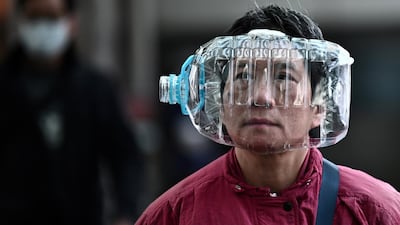In the 12 months since the World Health Organisation declared a global pandemic over the spread of Covid-19, its message has changed little: the control of its spread is in all of our hands and public measures are key to containing the threat.
A year later Dr Tedros Adhanom Ghebreyesus, director general of the WHO, told a meeting in Abu Dhabi on Wednesday that the pandemic he declared has turned our world upside-down.
Dr Tedros recalled that in 2018 he warned the world needed to build strong, resilient health systems to cope with emerging threats. He said the pandemic showed "the future is now".
Covid-19 has since hit the world in waves of new outbreaks. Last week Dr Tedros said the number of infections was rising after a six-week period in which new infections dropped back.
The decrease came because the first window of light had opened, in the form of global vaccine introduction.
"In combination with proven public health measures, vaccines are now giving us hope for bringing the pandemic under control," Dr Tedros said in Abu Dhabi.
But relaxation of mask measures and the emergence of new variants can quickly reverse any improvements.
The dangers exposed a year ago remain a potent threat to hundreds of millions around the globe.
When the pandemic was declared last March there were 118,000 cases reported in 114 countries, but 90 per cent of cases were in only four countries.
Dr Tedros said that in two countries, China and South Korea, the epidemic was declining.
According to Worldometer, there have more than 118 million cases of Covid-19 and 2.6 million deaths as of Wednesday.
In declaring the pandemic on March 11, 2020, Dr Tedros said the escalation was not inevitable.
"We cannot say this loudly enough, or clearly enough, or often enough: all countries can still change the course of this pandemic," he told a briefing in Geneva.
"If countries detect, test, treat, isolate, trace and mobilise their people in the response, those with a handful of cases can prevent those cases becoming clusters, and those clusters becoming community transmission.
"Even those countries with community transmission or large clusters can turn the tide on this virus."
On Wednesday, UN spokesman Stephane Dujarric lamented the failure of world powers to heed those words and work together against the disease and associated issues.
The response was “unco-ordinated right from the start” and “sadly, that is ongoing today”, Mr Dujarric said.
The UN’s coronavirus response largely ground to a halt last year amid worsening US-China relations.
Former US president Donald Trump riled Beijing with the phrase “China virus” and by blaming the outbreak on a Chinese laboratory.
As death rates soared across the US and New York became the global centre of the pandemic in March, Mr Trump urged Beijing to come clean about the origins of the virus.
Bickering between American and Chinese diplomats meant the UN’s top decision-making body, the Security Council, took nearly three months to pass a resolution calling for global solidarity against the coronavirus, in April 2020.
Mr Trump announced in May that the US would leave the WHO and stop funding it, criticising it for its response to the pandemic and accusing its officials of acting in China’s favour.
Since taking office in January, US President Joe Biden has reversed the decision to leave the WHO.
Last month, the UN Security Council agreed on a resolution on vaccinating people in war zones, indicating calmer international relations under the Biden administration.
But the UN says rich countries ordered more vaccines than necessary while poorer countries lack enough doses even for frontline healthcare staff, while the UN-backed Covax vaccine sharing scheme is badly underfunded.
"We can't ignore the amazing scientific response and the rapidity in which many member states have been able to develop effective vaccines," Mr Dujarric said.
"The scientists have done their job. It is now for multilateralism in a sense to do its job and to find a more co-ordinated response to the rollout of the vaccine."
The UN is marking the anniversary on Thursday by launching a campaign to give Covax the $2 billion it needs to offer vaccines to nearly 30 per cent of the populations of poor and middle-income countries by the end of the year.
"The only way we're really going to beat this and build back in a more sustainable way is with the right amount of investment," Mr Dujarric said.


















































